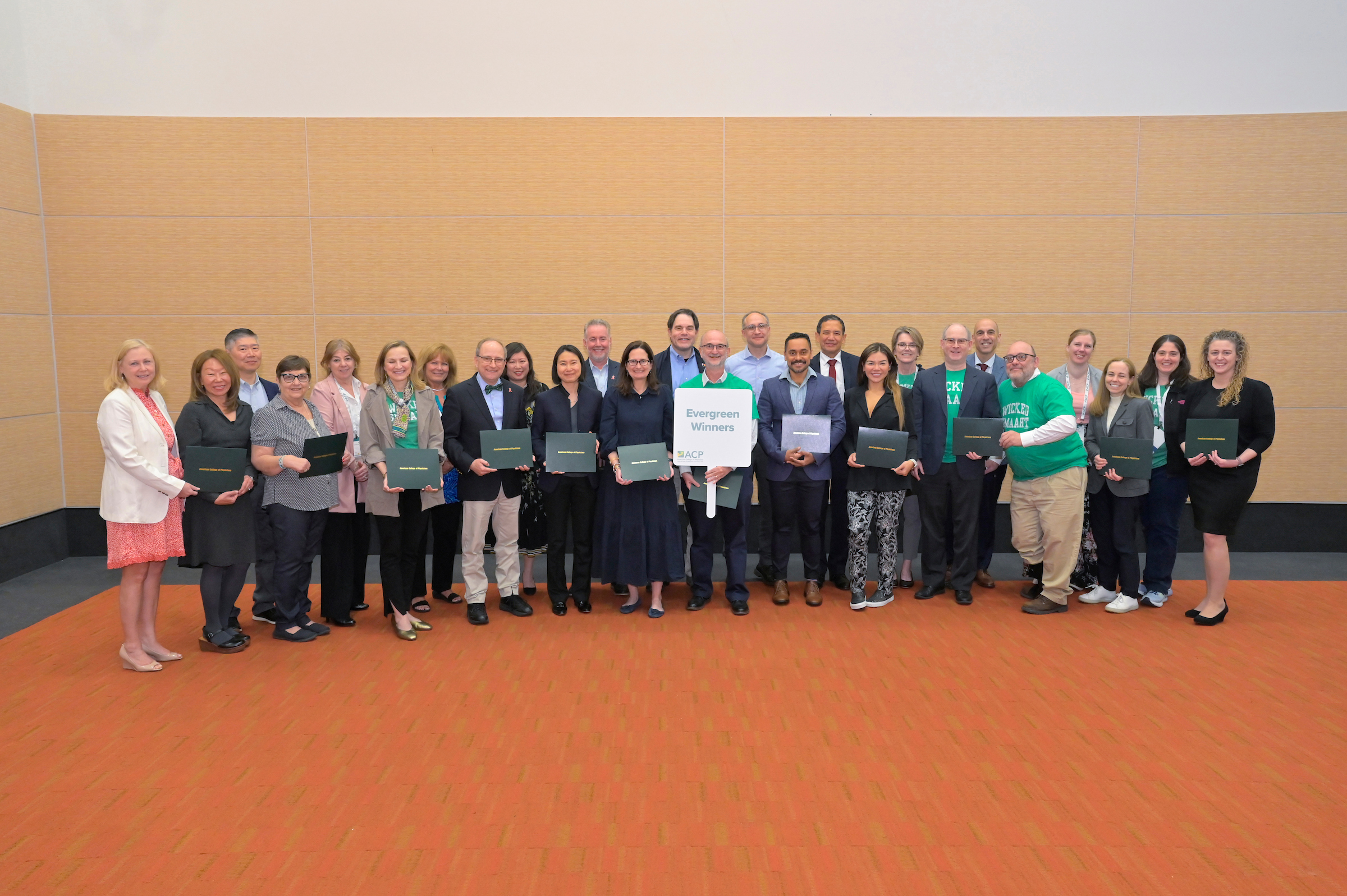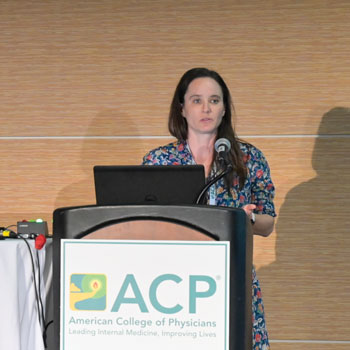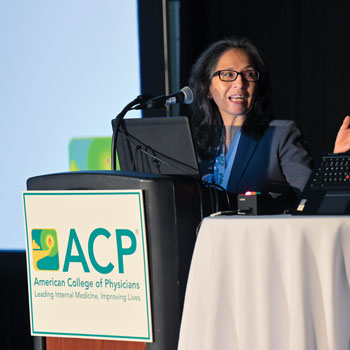Latest updates on ACP's priorities, initiatives
ACP Spotlight offers readers a look at ACP's current top priorities and initiatives, as well as highlights from our e-newsletter, I.M. Matters Weekly from ACP.
ACP outlines recommended policies for use of AI in medicine
Artificial intelligence (AI) technologies should complement clinician logic and decision making, not supplant them, ACP said in a new policy position paper.
The paper, "Artificial Intelligence in the Provision of Health Care," was approved by the Board of Regents on Feb. 20 and published June 4 by Annals of Internal Medicine.
The development, testing, and use of AI in health care must be aligned with principles of medical ethics and should enhance patient care, clinical decision making, the patient-physician relationship, and health care equity and justice, ACP said in the paper. The College reaffirmed its call for transparency in the development, testing, and use of AI for patient care in order to promote trust in the patient-physician relationship.
ACP recommended that patients, physicians, and other clinicians be made aware whenever possible if AI tools are likely being used in medical treatment and decision making. The College reaffirmed that AI developers, implementers, and researchers should prioritize the privacy and confidentiality of patient and clinician data in AI models. In addition, ACP recommended that clinical safety and effectiveness, as well as health equity, must be top priorities for developers, implementers, researchers, and regulators of AI-enabled medical technology and that the use of AI in health care should involve a continuous improvement process that includes a feedback mechanism.
ACP also reaffirmed that the use of AI and other emerging technologies in health care should reduce rather than exacerbate disparities in health and health care. AI developers must be accountable for the performance of their models, and a coordinated federal AI strategy with a unified governance framework is needed, ACP recommended. AI tools should always be designed to reduce clinicians' burdens in support of patient care, ACP said, and training in AI should be provided at all levels of medical education. Finally, ACP recommended that the environmental impacts of AI and their mitigation should be studied and considered.
A companion video on the paper featuring ACP President Isaac O. Opole, MBChB, PhD, MACP, can be viewed online.
ACP honors innovative chapter activities with the 2024 John Tooker Evergreen Awards

The John Tooker Evergreen Awards Program provides opportunities to recognize the valuable contributions of ACP chapters as they strive to enrich, educate, and engage membership. In 2024, ACP recognized 10 winning chapters. Descriptions of the winning programs are listed below. For more information on the John Tooker Evergreen Awards, contact Dana Acord at dacord@acponline.org.
Alberta: Point-of-Care Ultrasound Webinar Series
The point-of-care ultrasound (POCUS) webinar series was created to increase the availability of quality, desired educational offerings. A POCUS Education Council was appointed to guide this work, which in turn provided unique leadership opportunities for diverse early career physicians and trainees to address various aspects of POCUS and bring internationally known speakers to the forum.
Alabama: Laureate Society Fellowship Program
The Alabama Chapter Laureate Society Fellowship is a two-year long, fully funded program for residents and ACP members to promote an early and deep integration of promising resident physicians into ACP; introduce them to ACP chapter leaders, ACP national leaders, policymakers, mentors; and to encourage and promote their paths to advocacy and leadership at the state and national levels in the College.
Brazil: Faculty Development Program
The Brazil Chapter took on the challenge of strengthening their role as a leading provider of high-quality medical education programs across Brazil by creating a three-day faculty development program. ACP leadership participated in content creation and shared their expertise during the program. They believe that the low-cost model, based on alliances with local centers and volunteers, can be implemented in other international and national chapters. The event attracted over 200 attendees from 13 different states in Brazil.
Central America: Increasing Membership and Pride of Being an Internal Medicine Specialist in Central and Latin America
The Central America Chapter increased membership and pride in being an internal medicine specialist through a local Doctor's Dilemma competition in their own chapter and across other Latin countries. Doctor's Dilemma is not new to the Chapter but traditionally, just three teams compete locally with participants from Panama, Costa Rica, and Guatemala. Through this project and early career physician leadership, six Panamanian medical school teams and a new team from El Salvador, Guatemala, and Costa Rica held a final round of Doctor's Dilemma at the Panamanian Society of Internal Medicine (SPMI).
California Southern I, II, and III: Narrative Medicine Collaboration
To capitalize on the growing excitement about narrative medicine and create a supportive and welcoming community to enjoy the power of stories, reflection, and creativity, the Southern California Chapters created a narrative medicine competition in conjunction with the 2022 Southern California Chapters' Annual Meeting. The chapter threaded narrative medicine events throughout the year to incorporate distinguished faculty and well-being champions as judges, mentors, and collaborators.
California Southern III and North Carolina: Live Your Best Life Program
The Live Your Best Life (LYBL) Program utilized sessions and created a platform to promote leadership development, communication skills, professionalism, mentorship (including peer mentorship), networking opportunities, and promotion of well-being for nearly 60 invited Resident/Fellow and Early Career Physician members from across 23 Chapters.
Maryland: CRAB Soccer Tournament
In 2014, the Chief Residents Association of Baltimore (CRAB) proposed a soccer tournament with teams representing each residency program in Maryland. The goals were to promote well-being through physical activity and foster camaraderie among residents from different programs and with the Maryland ACP Chapter. The tournament has grown each year and is now one of the most important events the chapter hosts.
Michigan: Engagement Among Residents and Medical Student Members
The creation of Michigan's Resident and Medical Student Committee increased engagement of Internal Medicine Interest Groups (IMIGs) across all seven medical schools in the state. The intent was to create a forum for engagement and community among residents and medical students of the Michigan Chapter beyond the Annual Scientific Meeting and Resident/Medical Student Day.
New York: Physician Spotlight Podcast Collection
The NYACP Physician Spotlight Podcast Collection was created by the Medical Student Committee as an alternative method to engage and educate medical students on a career path in internal medicine. The podcast topics evolved to include advocacy experiences and successes, well-being topics, COVID-19 vaccination information, and tips for residency, spanning 23 episodes.
Wisconsin: New Multigenerational Scientific Program Session—Bridging the Gap for Student and Senior Chapter Members
Bridging the Gap was launched at Wisconsin's September 2023 Chapter Scientific Meeting to engage senior chapter members and medical students in mentorship. This program created a separate student-only poster session at the chapter meeting. Senior physicians were paired with council members as partner judges at the student-only poster session.
Special Recognition Awards
ACP awarded special recognition to one Chapter for its efforts in implementing innovative programming.
Caribbean for Virtual Regional Grand Rounds
As a multicountry chapter, Caribbean has leveraged online videoconferencing capabilities to host grand rounds highlighting medical residents from across the region. These quarterly grand rounds replicate those held at teaching hospitals, with an expanded audience of physicians from over 12 Caribbean countries.
For more information, contact Dana Acord at dacord@acponline.org.
ICYMI: Highlights from I.M. Matters Weekly
- Statins safe, offer benefits even in very old patients. Statin therapy was associated with lower incidence of cardiovascular disease (CVD) and all-cause mortality, even among people ages 85 years or older, and did not increase the risk for adverse events such as myopathies and liver dysfunction, according to a target-trial emulation that mimicked a randomized clinical trial. The results were published May 28 by Annals of Internal Medicine and summarized in the May 28 I.M. Matters Weekly from ACP.
- Hypoglycemia associated with food insecurity in older adults with diabetes. A survey of older adults with type 2 diabetes taking insulin or sulfonylureas found that both economic and physical food insecurity were related to increased risk for severe hypoglycemic events. The results were published May 20 by the Journal of General Internal Medicine and summarized in the May 28 I.M. Matters Weekly from ACP.
I.M. Matters Weekly from ACP is an e-newsletter published every Tuesday and available online at immattersacp.org/weekly. Subscribe online.




